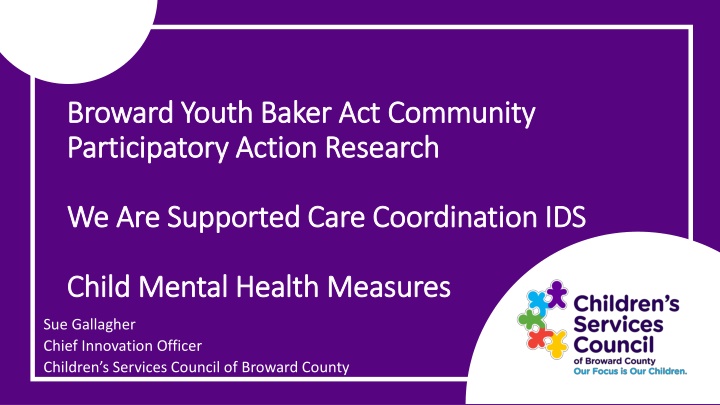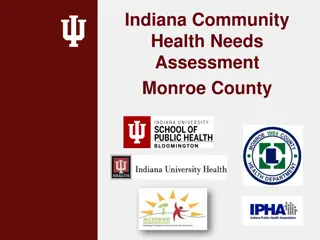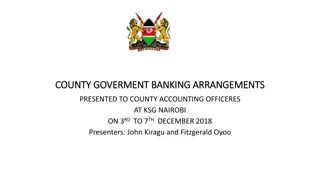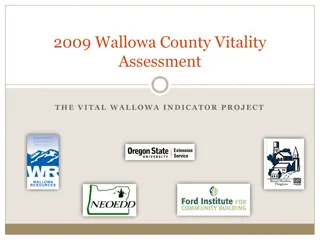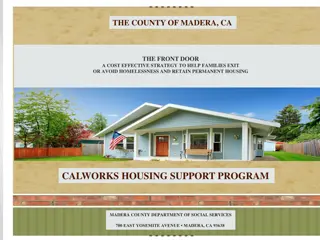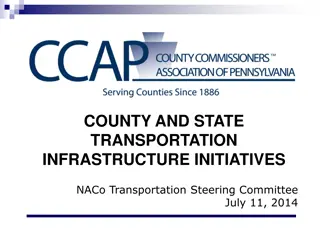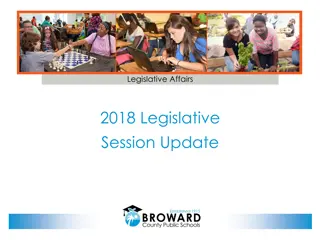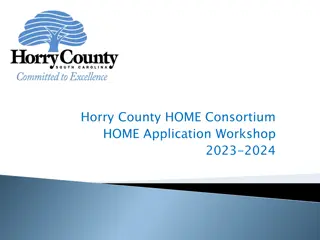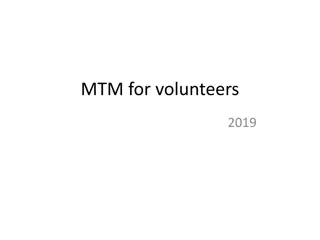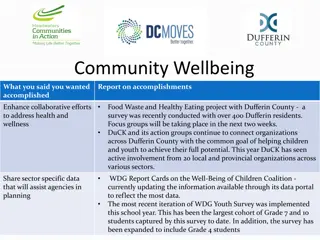Community-Based Research Initiatives in Broward County
Explore the collaborative efforts and initiatives in Broward County focusing on youth mental health, care coordination, and community empowerment through participatory action research. Key organizations like the Children's Services Council play a vital role in enhancing the lives of children and families. Discover how data collaboration and participatory structures contribute to the well-being of the community.
Download Presentation

Please find below an Image/Link to download the presentation.
The content on the website is provided AS IS for your information and personal use only. It may not be sold, licensed, or shared on other websites without obtaining consent from the author.If you encounter any issues during the download, it is possible that the publisher has removed the file from their server.
You are allowed to download the files provided on this website for personal or commercial use, subject to the condition that they are used lawfully. All files are the property of their respective owners.
The content on the website is provided AS IS for your information and personal use only. It may not be sold, licensed, or shared on other websites without obtaining consent from the author.
E N D
Presentation Transcript
Broward Youth Baker Act Community Broward Youth Baker Act Community Participatory Action Research Participatory Action Research We Are Supported Care Coordination IDS We Are Supported Care Coordination IDS Child Mental Health Measures Child Mental Health Measures Sue Gallagher Chief Innovation Officer Children s Services Council of Broward County
Todays Flow Today s Flow Broward County Demographics Broward Youth Baker Act Community Participatory Action Research (CPAR) Preliminary Findings I. II. We Are Supported Care Coordination Integrated Data System Pilot Update III. Suggestions for Child Behavioral Health Outcomes IV. Recommendations
Broward County Demographics Children s Services Council of Broward County Children s Services Council of Broward County The CSC's mission is to provide leadership, advocacy, and resources necessary to enhance the lives of the children of Broward County and empower them to become responsible, productive adults through collaborative planning and funding of a continuum of quality care.
Broward Data Collaborative 2017 Broward Data Collaborative 2017 Broward County Demographics Broward s Data Collaborative (BDC) integrates state and local data to contribute to the well-being of Broward s children, families and communities.
Broward County Demographics Why Community Participatory Action Research Why Community Participatory Action Research (CPAR) ? (CPAR) ? Act of Research is Healing Builds capacity of youth and families to use data, make decisions, lead, and advocate Expands professionals empathy, understanding, and tacit knowledge of people receiving services Possible solutions and strategies are expanded and enriched through relationships and the rigor of diverse perspectives Face difficult truths together Inspirational & Joyful
Broward County Demographics Participatory Structures Participatory Structures Build trusting & efficacious relationships with system professionals with youth & parents Co-research, co-imagine, co-construct solutions together, and share systemic capacity building People are powerful, knowledgeable, compassionate and can become change agents who can partner and belong in the process to make systemic contributions
Browards History of CPAR Projects 2018/19 Federal Performance Pilot Partnership grant (Feds $50,000 & CSC $17,000) Parents 2019/20, Florida Institute of Child Welfare grant (FICW $50,000 & CSC $12,000) System Pros Youth 2023/24, UPENN AISP Equity in Practice Learning Community grant ($70,000)
Broward CPAR Innovation Broward CPAR Innovation Broward County Demographics Context Experts (i.e., lived experience expertise) Youth and Parents who experienced Baker Act Content Experts (i.e., formal expertise) System Professionals (public agencies, funders, mental and behavioral health care providers, and Insurance Company) Humanizing & Transformative Relationships that produced rich data, discussion and policy, system, and narrative change
Broward County Demographics Florida Youth Baker Act Florida Youth Baker Act 34, 324 children annually Baker Acted in FL 1,878 children in Broward County ~ 22% children recidivate annually (Broward >400) Source: Data Florida Baker Act FY 22 Report
2023 Broward Youth Baker Act CPAR Desired Outcomes 1. Reduce the trauma of the Baker Process 2. Improve post-discharge care coordination for families and their youth who are Baker Acted 3. Reduce recidivism while improving mental health. 4. Inform the development of the We Are Supported integrated data system supported by the Broward Data Collaborative, Amazon Web Services, Velatura
CPAR Research Questions CPAR Research Questions 3-day CPAR workshop completed January 2023 co-researcher shared stories, found commonalities across experiences, learned about participatory research, developed partnering and caring relationships and finalized research questions. (1) PEG - What psycho-educational content can best inform parents & youth about the Baker Act process during their time of crisis that can reduce the trauma of Baker Acting and improve post-discharge care coordination? (2) BASTE - How can legislation, rules, and secure facility policies change with research on alternative models, approaches, and policies to improve the Baker Act process and post- discharge care coordination?
CPAR Data Collection & Analysis CPAR Data Collection & Analysis 6 youth & 6 system professionals designed data collection tools & methods for PEG & BASTE Conducted Focus groups & semi-structured interviews Researched best practices to improve experience to address legislation, rules & policy implementation Completed May 2023 Two-Day Data Analysis Workshop Developing Research Products & Recommendations May September 2023
Key CPAR Learnings Key CPAR Learnings Baker Act experience was traumatizing, including the feelings of: 1. criminalization due to Law Enforcement transporting youth to facilities 2. dehumanization caused by families knowing nothing about the Baker Act process and youth feeling helpless (no choices about what happens) and fear of non-compliance. 3. re-traumatization by the separation of families during the process, made worse due to the extremely limited visitation and communication between parents and their children. Co-researchers provided input and feedback on a family-centered consentform for the We Are Supported integrated data system
Thematic Analysis Thematic Analysis - - Frequency Frequency Failure to act as holistic system Alternative transportation LE transportation detrimental Need better process Importance of linkages Working well Need for funding More and better mental health services Co-responder model LE needed for safety
Thematic Analysis Thematic Analysis - - Relationships Relationships Alternative transportation Importance of linkages Need better process Failure to act as holistic system Need for funding More & better mental health services LE transportation detrimental Workin g well LE needed for safety Co-responder model
We Are Supported We Are Supported Technology Partners Broward Data Collaborative Healthcare Partners 16
We Are Supported We Are Supported Care Coordination Care Coordination IDS 1.0 IDS 1.0 3. Organizations, for whom consent has been given, receive notification of admission Alfredo and Melanie, Parent / Caregivers Christania, Hospital Staff Integrated Data System (IDS) 1. Baker Act facility obtains informed consent upon admission 2. IDS links youth to organizations for whom consent has been given 17
We are Supported IDS 2.0+ Anthony, Primary Care Physician 1. Care givers manage consent Alisha, Social Worker, BCPS Alfredo and Melanie, Parent / Caregivers Dennis, Case Manager, BBHC Nicole, Probation Officer, DJJ Integrated Data System (IDS) James, Non- Profit Coordinator, CSC 4. Care team members, for whom consent has been given, can view holistic information about the youth they support 2. Supportive services exchange information about the youth with the IDS 3. IDS links information to the youth Devon, Dependency Case Manager, ChildNet Christania, Hospital Staff 18
Proof Proof- -of of- -Concept (POC) Connect to Concept (POC) Connect to Co Co- -Design Demonstration Design Demonstration WHAT: POC demonstrates IDS capabilities and data flow In a synthetic testing environment (aka sandbox ) with realistic test data that resembles a production environment Without risk to patient data privacy or partner production systems HOW: Interoperability Workshop is a collaborative, hands-on event Allows participants to test integrating their systems with the IDS capabilities Produces an end to end, interoperable data flow WHEN: July 25, 2023 Who: Cross sector participants and national technology experts Three technology vendors will demonstrate integrated viewer Velatura Services backend IDS powered by AWS
Value Value - - Broward County and Beyond Broward County and Beyond Local Expands partnership with Hospital Districts, Receiving Facilities & Behavioral Health Providers Improves MH outcomes for children and families State FL Commission on Mental Health & Substance Abuse Integrated State Data System Connecting Local Governing/Participatory Structures Creates a technological solution to improve Baker Act post-discharge outcomes by creating a method to improve care coordination statewide for youth (potentially adults as well). National AISP Equity in Practice Learning Community - Advances a framework to create family-centered consent that met SAMSHA, FERPA and HIPPA requirements. - Provides a model for allowing people with lived experience to co-create an integrated data system/solution to improve care coordination in a human service system
Child Behavioral Health Measures Intervention (stop child abuse, not have diagnosis, at risk of SA, DV) Rate of Abuse Rate of Domestic Violence Treatment Results Based Accountability Level Prevention (Diagnosis, Residential Services) Mental Health Literacy gains Reduce Stigma Increase Social connections Community Reduce Baker Acts Cost of service, family engagement Staff recruitment, Retention Rate of Removals Cost of service, family engagement Staff recruitment, Retention System Aggregate CFARS and performance measures results Accessibility, Engagement, Satisfaction Discharge Plan Service Times Accessibility, Engagement, Satisfaction Discharge Plan Service Times Organization/Program How Much Did We Do? How Well Did We Do It? Is Anyone Better Off? Knowledge Skills Attitude Improvement NCFAS Family Functioning Survey Child in Home/Community Satisfaction (Learn, Help, Treat Well) CFRAS Family Functioning Survey Child in Home/Community Satisfaction (Learn, Help, Treat Well) Sustain improvement Enhanced Capabilities to support child Family Knowledge Skills Attitude Improvement Columbia Survey CGAS DJJ Educational Behaviors, attendance, Grades CFARS Drug Testing Child
Recommendations Recommendations Simultaneously build state data integration systems and local participatory structures to maximize learning and improved outcomes Establish Local Baker Act Learning Communities with youth and parents (trauma informed/healing & recovery oriented approach) Activate Care Team Members upon admission Support Funding Care Coordination Data System pilots/projects Explore 24/7 Psychiatry Services available for ER doctors Explore ways to safely minimize Law Enforcement transporting of youth
